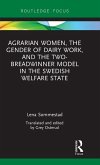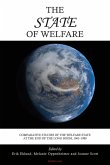Marginalized Groups, Inequalities and the Post-War Welfare State
Whose Welfare?
Herausgeber: Baár, Monika; Trigt, Paul van
Marginalized Groups, Inequalities and the Post-War Welfare State
Whose Welfare?
Herausgeber: Baár, Monika; Trigt, Paul van
- Gebundenes Buch
- Merkliste
- Auf die Merkliste
- Bewerten Bewerten
- Teilen
- Produkt teilen
- Produkterinnerung
- Produkterinnerung
With its focus on different marginalized groups: migrants and people with disabilities, this volume offers novel perspectives on the national and international dimensions of the post-war welfare state in Western Europe and North America.
Andere Kunden interessierten sich auch für
![Agrarian Women, the Gender of Dairy Work, and the Two-Breadwinner Model in the Swedish Welfare State Agrarian Women, the Gender of Dairy Work, and the Two-Breadwinner Model in the Swedish Welfare State]() Lena SommestadAgrarian Women, the Gender of Dairy Work, and the Two-Breadwinner Model in the Swedish Welfare State71,99 €
Lena SommestadAgrarian Women, the Gender of Dairy Work, and the Two-Breadwinner Model in the Swedish Welfare State71,99 €![The Life and Times of Sir Edwin Chadwick The Life and Times of Sir Edwin Chadwick]() S. E. FinerThe Life and Times of Sir Edwin Chadwick228,99 €
S. E. FinerThe Life and Times of Sir Edwin Chadwick228,99 €![Welfare in the United States Welfare in the United States]() Welfare in the United States185,99 €
Welfare in the United States185,99 €![Assets and the Poor Assets and the Poor]() Michael SherradenAssets and the Poor168,99 €
Michael SherradenAssets and the Poor168,99 €![A Free Trade Essential to the Welfare of Great Britain, Or, an Inquiry Into the Cause of the Present Distressed State of the Country, and the Conseq A Free Trade Essential to the Welfare of Great Britain, Or, an Inquiry Into the Cause of the Present Distressed State of the Country, and the Conseq]() John ClayA Free Trade Essential to the Welfare of Great Britain, Or, an Inquiry Into the Cause of the Present Distressed State of the Country, and the Conseq25,99 €
John ClayA Free Trade Essential to the Welfare of Great Britain, Or, an Inquiry Into the Cause of the Present Distressed State of the Country, and the Conseq25,99 €![The State of Welfare The State of Welfare]() The State of Welfare70,50 €
The State of Welfare70,50 €![Agriculture and Population the Truest Proofs of the Welfare of the People: Or, an Essay On Public Happiness: Investigating the State of Human Nature T Agriculture and Population the Truest Proofs of the Welfare of the People: Or, an Essay On Public Happiness: Investigating the State of Human Nature T]() François Jean ChastelluxAgriculture and Population the Truest Proofs of the Welfare of the People: Or, an Essay On Public Happiness: Investigating the State of Human Nature T36,99 €
François Jean ChastelluxAgriculture and Population the Truest Proofs of the Welfare of the People: Or, an Essay On Public Happiness: Investigating the State of Human Nature T36,99 €-
-
-
With its focus on different marginalized groups: migrants and people with disabilities, this volume offers novel perspectives on the national and international dimensions of the post-war welfare state in Western Europe and North America.
Produktdetails
- Produktdetails
- Verlag: Routledge
- Seitenzahl: 212
- Erscheinungstermin: 28. Oktober 2019
- Englisch
- Abmessung: 240mm x 161mm x 16mm
- Gewicht: 487g
- ISBN-13: 9781138388826
- ISBN-10: 1138388823
- Artikelnr.: 58051414
- Herstellerkennzeichnung
- Libri GmbH
- Europaallee 1
- 36244 Bad Hersfeld
- gpsr@libri.de
- Verlag: Routledge
- Seitenzahl: 212
- Erscheinungstermin: 28. Oktober 2019
- Englisch
- Abmessung: 240mm x 161mm x 16mm
- Gewicht: 487g
- ISBN-13: 9781138388826
- ISBN-10: 1138388823
- Artikelnr.: 58051414
- Herstellerkennzeichnung
- Libri GmbH
- Europaallee 1
- 36244 Bad Hersfeld
- gpsr@libri.de
Monika Baár is Professor by Special Appointment of Central European Studies at Leiden University. She is principal investigator of the ERC-funded research project Rethinking Disability: the Global Impact of the International Year of Disabled Persons (1981) in Historical Perspective. Paul van Trigt is postdoctoral researcher in the ERC-project Rethinking Disability: the Impact of the International Year of Disabled Persons (1981) in Global Perspective at the Institute of History, Leiden University.
Introduction (Monika Baár and Paul van Trigt) Part One: Marginalized Groups
and International Welfare Practices 1. Rescuing the European Welfare State:
The Social Affairs Committee of the European Communities, 1953-1962 (Brian
Shaev) 2. From Territorialized Rights to Personalized International Social
Rights? The Making of the European Convention on the Social Security of
Migrant Workers (1957) (Karim Fertikh) 3. The International Labour
Organization (ILO) and the 'Capitalist' Economic Shift in the International
Vocational Rehabilitation Policy of Disabled People after World War II.
(Gildas Brégain) 4. Bordering (on) a Welfare State: Examining Refugee
Assistance as 'International Welfare' (Evan Easton-Calabria) 5. Social
Rights in Neoliberal Europe. The Disability Policy of the European Union
and the End of the Cold War (Paul van Trigt) Part Two: Marginalized Groups,
International Developments and National Welfare State Practices 6. The
History of a Phantom Welfare State: the United States (Rose Ernst) 7.
Managing the Transition from War to Peace: Post-war Reconstruction and
Citizenship-based Welfare in Italy and France (Giacomo Canepa) 8. Poverty,
(Un)employment, Marginalization: the Impact of the 'Neoliberal Turn' on
Disabled Citizens in Britain (Monika Baár) 9. Welfare Defended, Questioned,
Complemented? Belgian Welfare Arrangements in the 1970s-1980s from the
Perspective of Disability Organizations (Anaïs Van Ertvelde) 10. From
Liberal to Restrictive: the Danish Welfare and Immigration Policy,
1983-2006 (Heidi Vad Jønsson) Conclusion and Outlook 11. The Welfare State
and Exclusion: Human Rights and the Basic Protection of Marginalized Groups
(Veronika Flegar)
and International Welfare Practices 1. Rescuing the European Welfare State:
The Social Affairs Committee of the European Communities, 1953-1962 (Brian
Shaev) 2. From Territorialized Rights to Personalized International Social
Rights? The Making of the European Convention on the Social Security of
Migrant Workers (1957) (Karim Fertikh) 3. The International Labour
Organization (ILO) and the 'Capitalist' Economic Shift in the International
Vocational Rehabilitation Policy of Disabled People after World War II.
(Gildas Brégain) 4. Bordering (on) a Welfare State: Examining Refugee
Assistance as 'International Welfare' (Evan Easton-Calabria) 5. Social
Rights in Neoliberal Europe. The Disability Policy of the European Union
and the End of the Cold War (Paul van Trigt) Part Two: Marginalized Groups,
International Developments and National Welfare State Practices 6. The
History of a Phantom Welfare State: the United States (Rose Ernst) 7.
Managing the Transition from War to Peace: Post-war Reconstruction and
Citizenship-based Welfare in Italy and France (Giacomo Canepa) 8. Poverty,
(Un)employment, Marginalization: the Impact of the 'Neoliberal Turn' on
Disabled Citizens in Britain (Monika Baár) 9. Welfare Defended, Questioned,
Complemented? Belgian Welfare Arrangements in the 1970s-1980s from the
Perspective of Disability Organizations (Anaïs Van Ertvelde) 10. From
Liberal to Restrictive: the Danish Welfare and Immigration Policy,
1983-2006 (Heidi Vad Jønsson) Conclusion and Outlook 11. The Welfare State
and Exclusion: Human Rights and the Basic Protection of Marginalized Groups
(Veronika Flegar)
Introduction (Monika Baár and Paul van Trigt) Part One: Marginalized Groups
and International Welfare Practices 1. Rescuing the European Welfare State:
The Social Affairs Committee of the European Communities, 1953-1962 (Brian
Shaev) 2. From Territorialized Rights to Personalized International Social
Rights? The Making of the European Convention on the Social Security of
Migrant Workers (1957) (Karim Fertikh) 3. The International Labour
Organization (ILO) and the 'Capitalist' Economic Shift in the International
Vocational Rehabilitation Policy of Disabled People after World War II.
(Gildas Brégain) 4. Bordering (on) a Welfare State: Examining Refugee
Assistance as 'International Welfare' (Evan Easton-Calabria) 5. Social
Rights in Neoliberal Europe. The Disability Policy of the European Union
and the End of the Cold War (Paul van Trigt) Part Two: Marginalized Groups,
International Developments and National Welfare State Practices 6. The
History of a Phantom Welfare State: the United States (Rose Ernst) 7.
Managing the Transition from War to Peace: Post-war Reconstruction and
Citizenship-based Welfare in Italy and France (Giacomo Canepa) 8. Poverty,
(Un)employment, Marginalization: the Impact of the 'Neoliberal Turn' on
Disabled Citizens in Britain (Monika Baár) 9. Welfare Defended, Questioned,
Complemented? Belgian Welfare Arrangements in the 1970s-1980s from the
Perspective of Disability Organizations (Anaïs Van Ertvelde) 10. From
Liberal to Restrictive: the Danish Welfare and Immigration Policy,
1983-2006 (Heidi Vad Jønsson) Conclusion and Outlook 11. The Welfare State
and Exclusion: Human Rights and the Basic Protection of Marginalized Groups
(Veronika Flegar)
and International Welfare Practices 1. Rescuing the European Welfare State:
The Social Affairs Committee of the European Communities, 1953-1962 (Brian
Shaev) 2. From Territorialized Rights to Personalized International Social
Rights? The Making of the European Convention on the Social Security of
Migrant Workers (1957) (Karim Fertikh) 3. The International Labour
Organization (ILO) and the 'Capitalist' Economic Shift in the International
Vocational Rehabilitation Policy of Disabled People after World War II.
(Gildas Brégain) 4. Bordering (on) a Welfare State: Examining Refugee
Assistance as 'International Welfare' (Evan Easton-Calabria) 5. Social
Rights in Neoliberal Europe. The Disability Policy of the European Union
and the End of the Cold War (Paul van Trigt) Part Two: Marginalized Groups,
International Developments and National Welfare State Practices 6. The
History of a Phantom Welfare State: the United States (Rose Ernst) 7.
Managing the Transition from War to Peace: Post-war Reconstruction and
Citizenship-based Welfare in Italy and France (Giacomo Canepa) 8. Poverty,
(Un)employment, Marginalization: the Impact of the 'Neoliberal Turn' on
Disabled Citizens in Britain (Monika Baár) 9. Welfare Defended, Questioned,
Complemented? Belgian Welfare Arrangements in the 1970s-1980s from the
Perspective of Disability Organizations (Anaïs Van Ertvelde) 10. From
Liberal to Restrictive: the Danish Welfare and Immigration Policy,
1983-2006 (Heidi Vad Jønsson) Conclusion and Outlook 11. The Welfare State
and Exclusion: Human Rights and the Basic Protection of Marginalized Groups
(Veronika Flegar)









